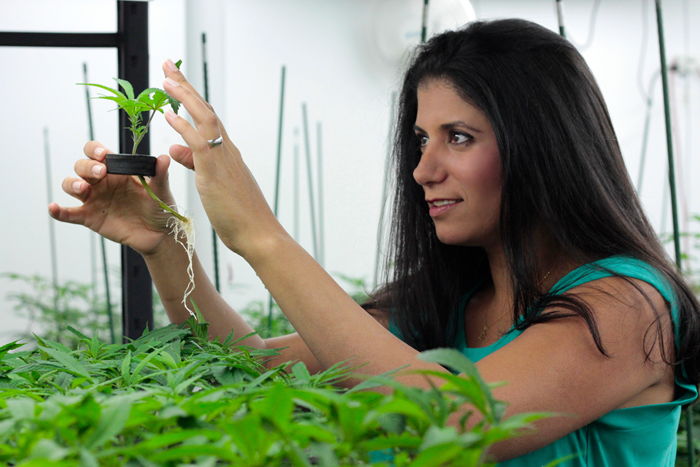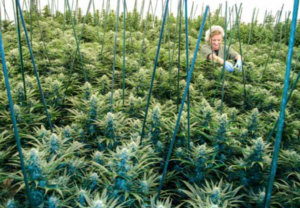Photo: Lilach Mazor Power inspects a plant in one of the many grow rooms at her dispensary.
The Giving Tree Wellness Center lies in one of the many typical business parks located in North Phoenix. When you walk through the doors, it appears like any medical professional’s office with a couple of distinct exceptions. Instead of landscape or graphic prints, the art on the walls depicts photos of marijuana leaves and flowers, and the smell of these flowers hangs like a pungent perfume in the air.
The Giving Tree is not just any dispensary; it is a place where patients issued a medical marijuana card can sit down, one-on-one, with a consultant and get educated on the best cannabis product for them.
That is the goal of Founder and Managing Director, Lilach Mazor Power. “I want to make sure people understand they’re not criminals; they don’t need to hide it,” she says. “We’re trying to fight stigma here. This is a professional place; most of my employees have degrees. We’re creating something different here.”
FORGING HER PATH
Lilach did not originally set out with the goal of becoming a cannabis entrepreneur. Her husband, Keith Power, is an emergency room doctor, and they found their conversations frequently steer towards the striking number of patients that end up in the ER, searching for hope and answers as they navigate chronic illness and pain.
These conversations led her to understand the need for a community wellness center, “a place that is warm and welcoming for both physicians and people to have a discussion.” She envisioned having a nutritionist, yoga instructor and masseuse on staff to help complement the traditional medical treatments the patients were receiving.
“So I created this great business plan and discovered that there is absolutely no money in it,” jokes Lilach. “So I dropped it, and then this (medical marijuana) came up on the ballot. So it was perfect.”
Medical use of marijuana in Arizona was legalized by way of Proposition 203 in 2010. Lilach had befriended Dr. Gina Berman, who worked with Keith and supported the couple when Lilach was pregnant with her first child. When Proposition 203 came up on the ballot, they decided to apply for a license together. “We applied for four and got two,” says Lilach.
“We went through this whole journey together. Which was amazing because we got to work to create this whole thing,” reflects Lilach. The two parted ways more than a year ago. “We just wanted different things. We were amazing at starting the business together.”
The Giving Tree Wellness Center opened in 2013. “Back then, no one wanted to talk to us,” remembers Lilach. “Nobody wanted to give us any money; we had to self-fund, so we had to put everything we had into this. No one wanted to work for us. It’s funny what’s happened in seven years, but I couldn’t get someone with a degree to work here. Nobody wanted to put it on their resume.” Now, she says if they post a position online in the afternoon, they receive over 200 applications by the next morning.
In the beginning, Lilach had to hire people who used to grow marijuana illegally because they were the only people with experience. The result is an industry built upon knowledge from people who once grew in their basement being repurposed to growing in a strictly regulated manner to provide for patients. These growers need to be very compliant with tracking because marijuana remains a controlled substance. Lilach came to understand the difficulty that comes with marrying the two unlikely necessities of running a dispensary: legal protocol and formerly underground growers.
“It was a challenge,” admits Lilach. “You lose a lot of money and learn from your mistakes. I do consulting now that we are in other markets, and I always say, ‘I learned what doesn’t work and I’ll make sure you don’t do the same.’ ”
There is no “handbook” for growing marijuana. If you want to grow corn in the Midwest, it is very easy to go to the agricultural department with a dream and a soil sample, where they tell when and where you should plant and how you should do it, all summarized in standard operating procedures.
Over time, Lilach and her team have come up with their own SOP’s to follow. But it hasn’t been easy without any SOPs to compare them to. You can’t consult with the health department, department of agriculture, or universities because of the federal restrictions.
Lilach believes being Israeli has helped her better tolerate the ups and downs of this industry. “It’s a normal operating mentality for us – we do live riskier than others. You have to do something you love because you don’t know what’s going to happen tomorrow,” she says. “I’m a risk-taker. I enjoy the madness and I enjoy being in a new industry, but I remember a few times saying, ‘What are we doing? This is too hard.’ and I remember my mom saying. ‘It’s not easy to change history.’ And those words kind of stuck with me.”
In Israel, cannabis is illegal but partially decriminalized, meaning possession of a small amount its not a criminal offense, and it is allowed for some specified medical usages. In fact, Raphael Mechoulam, an organic chemist and professor of medicinal chemistry at the Hebrew University of Jerusalem, was one of the first to discover the medical benefits of cannabinoids.
“In Israel, the research comes out of there because they are open to it,” says Lilach. “The universities, the agriculture department, Technion, Ben Gurion, hospitals – everyone is doing research. Hebrew University has 17 labs there dedicated to the study of cannabis. There are zero in Arizona.”
She continues, “It brings benefits that we do not have.”
FROM SEED TO STORE
The Giving Tree is vertically integrated, meaning they do everything in-house. They grow, extract, sell flower wholesale, and even have a couple of their own brands, Kindred and Katatonic, that they wholesale to 42 of the more than 100 dispensaries in the state.
The Kindred brand is for active professional adults who may want to incorporate a daily dose of cannabis into their lifestyle, but don’t want to smoke it. The Kindred line consists of capsules, breath strips and massage oil.
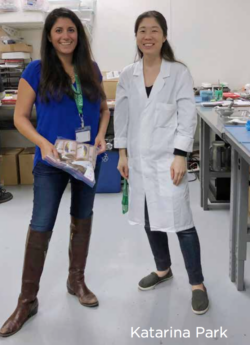 Katatonic is extracted through the use of CO2, which separates the pure cannabinoid compounds from unwanted residual solvents, thus creating the chemically purest high you can get. “If you want to get high and put good things into your body, Katatonic is your brand,” says Lilach.
Katatonic is extracted through the use of CO2, which separates the pure cannabinoid compounds from unwanted residual solvents, thus creating the chemically purest high you can get. “If you want to get high and put good things into your body, Katatonic is your brand,” says Lilach.
These brands were created with the expert guidance of chemist Katarina Park, who joined Giving Tree five years ago.
When Lilach connected with Katarina initially, she basically told her, “Here’s your room with four walls – go!”
“I had no clue. I just knew I wanted extraction, I wanted to create products and I wanted branding because I come from a marketing background,” says Lilach. “There’s beer and then there’s Heineken. We want to be ‘top shelf’ cannabis. So she created everything we have.”
Before Katarina, they grew and sold flower, pre-rolls, and hash, but to get to the point where they can give a patient a 5-milligram nighttime capsule; that’s where the chemistry comes in. Katarina is also the namesake of the Katatonic line.
However, before any of the plants get to the lab for Katarina to work her magic, they have a lot of growing to do.
Jesse Miller is the cultivation manager at Giving Tree. He grew up on a corn and soybean 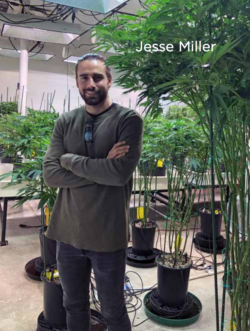 farm in central Illinois; this upbringing influenced his path to get a master’s degree in plant, soil and agricultural systems from SIUC.
farm in central Illinois; this upbringing influenced his path to get a master’s degree in plant, soil and agricultural systems from SIUC.
The beginning of any plants’ journey is the “mother room.” This room houses the “mother” plants, where an exact clone can be propagated by snipping a stem and putting it into “rockwool.”
Rockwool is a lightweight, hydroponic substrate that is made from spinning molten rock into fine fibers which are then formed into cubes.
“It’s a nice place for water and nutrients to be absorbed and roots to grow,” says Jesse. “This was just a stem and then it becomes an individual plant. “It takes about 17 days to form and establish a root system.”
The next grow room is much warmer. The plants are kept at an optimal growing temperature of 80-85 degrees. As the plants get larger, they will be transplanted into larger cubes. They will spend a total of four weeks under 18 hours of continuous light.
The next step is to move into a flower room where they will spend the rest of their life. Their lifecycle has now been changed to 12 hours of light and 12 hours of darkness. “We’ve manipulated the environment to tells them it’s the time of the season to create and produce flowers,” explains Jesse.
The first few weeks they’ll continue to get bigger and bigger and then eventually they’ll stop growing in size as they focus all their attention on flowering. Large fans are placed in the flower rooms to help with humidity and to strengthen the branches as they’re constantly moving. If there is a lot of stagnant air, it’s easier for mold to grow. At this stage, the plants are also grown in coconut husks that resemble soil but are essentially a hydroponic growing system, as all the nutrients are supplied through a fertilizer solution.
“We have nine rooms and they’re all in different stages,” says Lilach. “Every week we ‘take down’ a room which means we harvest a room and we flip it and start over again.”
Jesse points out a plant that is about seven weeks old. “Now that’s it maturing you see the little orange hairs, the pistils on the female plant, that’s what’s supposed to capture the pollen,” he explains. “What’s really valuable is the frostiness we call trichomes, that hosts the terpenes that are responsible for the smell and the taste.”
Each strain of plant has its own unique terpene profiles.
Lilach explains the profile of one strain called ACDC. This strain has a high CBD content but low THC, so you get the benefits of the cannabinoids without the mind-altering effects. This is different than the widely available CBD oil that is derived from hemp. The hemp product has a single cannabinoid molecule, while the CBD derived from cannabis contains 100 molecules. “This is the medicine that helps seizures. It’s what we donate to pediatric patients.”
The mother plant of the ACDC strain came from a patient who grew it for his wife. Due to legal ramifications, he no longer wanted to own the plant, but he also didn’t want to throw it away, so he gave it to Giving Tree.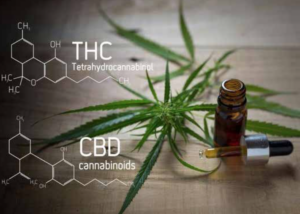
“This plant is 15% CBD, so it’s high, but very hard to grow so not many growers will spend the time,” says Lilach. “The structure of the plant is very annoying, it’s very finicky. But this is why we’re here. It’s worth it.”
There are other challenges Giving Tree encounters besides finicky plants. Even though they are growing inside, they still have to contend with pests, fungus, molds and equipment failure. “The rule in Arizona,” says Lilach. “If you’re going to lose an air conditioner, it’s usually going to be in August.”
Jesse explains another interesting phenomenon. “The plants can hermaphrodite as well. There are all female plants in the building, we don’t want males because they produce pollen and that will lead to having seeds in the flower and that will decrease the value of the product. We’ve had that happen because female plants can hermaphrodite and produce male parts.”
“When a female plant is stressed, it goes to male,” states Lilach with a chuckle. “It’s true!”
After they harvest the plants, a team will trim the flowers and leaves off the stem and the flowers will go on racks to dry out for 5-7 days at 65 degrees and very low humidity. The flowers need to be constantly monitored for moisture at this stage.
After cultivation, all the by-products go to the lab where it is dried, shredded and put through the CO2 system. “There we’ll run it with certain parameters and then we’ll extract out the oil,” says Katarina. “Once that’s done, we refine the extract a little bit more and then the refined oil is used for all of our products.”
THE FUTURE OF THE INDUSTRY
The Arizona Marijuana Legalization Initiative may appear on the ballot in Arizona on November 3, 2020. The ballot initiative would legalize the possession and use of recreational marijuana for adults age 21 years or older.
Currently, there are about 200,000 patients in all of Arizona with a medical marijuana card and about 100 stores competing for their business. If this initiative passes, there will be a potential increase of dispensary customers to anyone over 21, which is 3 million people in Arizona.
Lilach is excited for the prospect. “I believe this should be part of people’s wellness lifestyle. Taking microdosing of cannabinoids every single day is very helpful actually,” She continues, “When you take a small dosing of cannabinoid CBD, you get the whole entourage of effects of the cannabinoid but you don’t get the high. It’s like putting your pink glasses on, the world is a little better.”
Whatever the outcome of the election, Lilach will continue to run her business as she has for the past seven years.
“We are the only dispensary I know that has a 100% money-back guarantee,” says Lilach. “Understand that this is a journey. If you went home and it didn’t work don’t just give up. Bring it back, we will exchange it and work on something else and if you allow us, we will call you in two days and see how that worked.”
At this point, after consulting with the patient, they get the treatment right close to 90% of the time. “Migraines, back pain, Crohn’s – whatever condition you have, we have enough data,” says Lilach.
She currently employs 40 people, who she considers her family. “The team here is phenomenal,” she says. “We go through different things, this is not always easy, but it’s amazing how everyone supports each other. We have a bigger purpose.”
They volunteer as a company, raise money for various causes and will be happy to share their knowledge with the community through complimentary educational events. “There are so many people with questions who are afraid to ask,” says Lilach. “This is not a sales pitch. I sell cannabis. Everything we do is aligned to give back to our community, to educate our community, and I think that is part of my Judaism.”
Lilach is currently the only woman in Arizona who is the majority owner in a dispensary; others are partners, but none are sole owners. While this fact is frustrating for her, it doesn’t stop her from setting her goals for the future. For 2020 they would like to move their dispensary to more of a retail location, but not so far that they can’t continue to serve their loyal patients.
“Zoning is very hard and it’s hard to find locations, that the focus to move (the dispensary) to a better location and use the rest of the space here for more automation for our lab, a bigger distribution and inventory center to be able to supply to all our partnerships,” says Lilach.
“It’s not easy and we are changing history, so it’s something bigger than my own business,” she continues. “It’s the satisfaction of not just going to work, not just doing something small, but really effecting a movement. It’s fun and I love it.”
The Giving Tree Dispensary is located at 21617 N. Ninth Ave, in Phoenix. Visit them online at givingtreedispensary.com.


